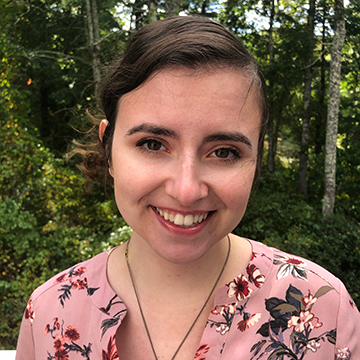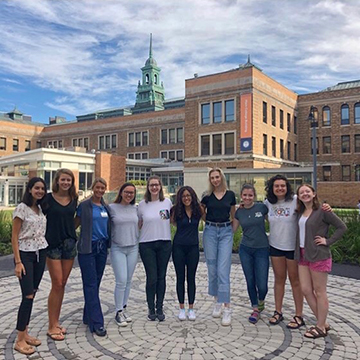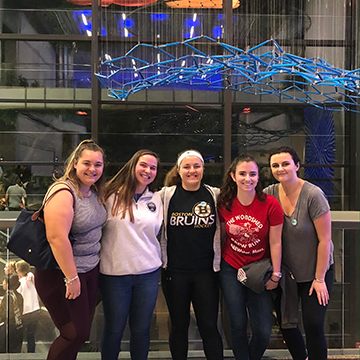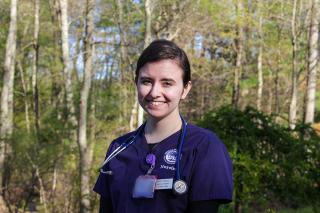What inspired you to declare a major in nursing and a minor in Spanish?

I always wanted a career where I could help people. I have two aunts in the nursing field that I was able to shadow in high school, and I loved it. I love the science and critical thinking aspects, and I also love being able to provide direct care to patients — to be there to talk with them and make their hospital stays even just a little bit better.
I decided to minor in Spanish because I want the ability to communicate with as many people as possible. Staying in the hospital can be scary and painful. When you don’t speak the language, and your caregivers can’t speak your language, it’s even harder. I want to be able to make recovery as smooth and comfortable as possible for people, and being able to communicate with patients is the first step.
Why did you decide to come to Simmons?
When I was researching schools, I came across Simmons, and I saw how highly rated the nursing program is. I fell in love with Simmons when I came on my first tour. The campus was beautiful, and every student and faculty member I interacted with was so helpful and positive. I immediately got a strong sense of community and support on that first tour, and I knew I wanted to go to Simmons.
Do you have a favorite nursing course you've taken so far?
My favorite nursing class so far has been “Maternity Nursing.” I absolutely loved learning about the stages of pregnancy and birth and about different complications. My clinical at Newton Wellesley Hospital was an amazing experience — I got to see different births and how to respond to emergencies.
Tell us about your clinicals at Brigham and Women's Hospital and Massachusetts General Hospital.
My clinicals at Brigham and Women’s Hospital and Massachusetts General Hospital were incredible learning experiences. I’ve learned the highest standards of care and interacted with such a wide variety of people with interesting and complex medical histories. I’ve also witnessed some fantastic nurses and doctors in action, solving problems and providing care. It’s been such a privilege to learn in these hospitals.
The biggest lesson I’ve learned through my clinicals has been the power of open communication with patients. I’ve had patients throughout my clinicals who either can’t speak English or, for various reasons, who just don’t want to communicate with their care team. Taking the time to talk to them in a way they understand and connect with has made a big difference. Some people don’t talk about how they’re doing because they just want to leave the hospital, and some people feel like their providers are not hearing them, so they don’t even try to talk. I love being there to talk to patients, encourage them to ask questions and communicate their needs and concerns. I’ve noticed a difference in people when they feel like they have somebody on their side listening to them.
I’ve also loved being able to translate for patients, as often, there are no nurses on the unit who speak Spanish. We have great translator services, but it’s nice to sit down with patients and ask them about things like their families, how they’re feeling, and how their breakfast was, instead of just what medications they need and when their next procedure is.
I’ve also noticed that sometimes patients still have questions about what’s happening even after talking with the translator. So it’s important to stick around and make sure they understand everything and don’t have any more questions. Being hospitalized is a scary and overwhelming experience. Whether you don’t speak English or you don’t feel like you can talk to your providers about everything, communication can make an enormous difference in your care.
As a women-centered University, Simmons has helped me find my voice and confidence.
Tell us about your experience as a Simmons Academic Mentor (SAM).

I love being a SAM. I was drawn to the role because I wanted to help new students as they transition into college. I think it’s easy to feel lost and overwhelmed as first-year students, and it can be difficult to know where to turn. For nursing students specifically, I think the prospect of upcoming clinicals and nursing classes can be overwhelming when you don’t know what to expect. I wanted to be there to help answer questions and give advice because I know how many questions I had during my first year.
I’ve definitely learned a lot about expectations and perspective through the SAMs. Frequently I get questions from students about what will happen after receiving a C on a test or whether they can take a certain class because they don’t feel like they’re smart enough. In general, we get swept up in this idea that we need to be perfect, need to have everything completely figured out, and need to get perfect grades on each assignment. But one bad grade is not the end of the world! And it’s okay not to be the smartest in the room — it just means you’ll have more opportunities to learn and grow.
How is Simmons preparing you to become a leader in your field?

Simmons is one of the best nursing schools and an incredibly supportive and nurturing environment. I’ve collaborated with some fantastic people at Simmons, and I’ve learned a lot about teamwork and problem solving through my classes and working as a SAM. As a women-centered University, Simmons has helped me find my voice and confidence. I’m not fighting to be heard during class discussions and group work, and I’ve found myself getting much more assertive and confident as the semesters go by at Simmons. As somebody who isn’t necessarily the most extroverted or assertive, Simmons has given me the support and tools I needed to come out of my shell and find my voice.
Do you have a favorite Simmons memory?
It’s so hard to pick just one! I have so many fond memories of getting curly fries at Bartol Late Night and last-minute group study sessions in the library. I think one of my absolute favorite Simmons memories would be speaking at this year’s Undergraduate Symposium. I’ve always considered myself more introverted and struggled with public speaking. Presenting my work in a different language at an event like the Symposium was not something I ever thought I’d do. But Professor Pelaez, who teaches some of my absolute favorite classes at Simmons, reached out and asked me to present my final project from “Spanish Culture As Seen Through Film.” I was so excited and so scared at the same time, but it was such a cool experience that took me out of my comfort zone.

